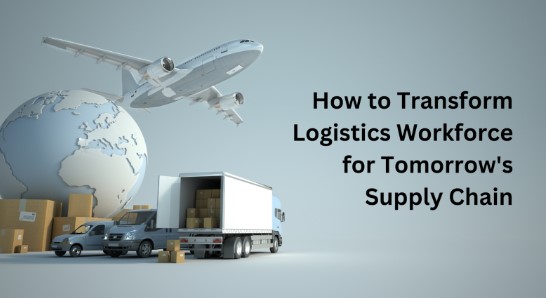The logistics industry stands at a pivotal moment. As global supply chains become more digitized, customer expectations continue to evolve, and sustainability takes center stage, the need for a future-ready logistics workforce has never been greater.
This transformation presents a significant opportunity to become a strategic player in the regional and national supply chain for the best logistics company in Guwahati. But how can logistics businesses, especially in emerging regions, successfully transition their workforce for tomorrow’s demands?
Why Workforce Transformation is the Need of the Hour
Logistics has typically been labor-intensive with manual duties such loading, driving, and simple stock control. The future, nevertheless, calls for technologically savvy people who can work together with intelligent logistics systems, data systems, and automation.
The incorporation of technology into every logistics process helps employees to stay current by adapting. Customers want quicker, more clear, and more adaptable deliveries, inspiring companies to rethink positions.
The need for resilient, flexible, and technology-enabled workforces has been amplified by the worldwide supply chain disruptions encountered during the epidemic.
Major Forces Reshaping the Logistics Workforce
Converging digital, environmental, and demographic pressures are driving a major overhaul of the logistics sector. These changes are not only altering how products are transported but also how people operate, cooperate, and upskill within the industry.
At the vanguard of this transformation are digital disruptions. Automated warehouses, AI-driven sorting technologies, and cloud-based logistics platforms streamline operations and limit human error. Real Time asset tracking made possible by the Internet of Things (IoT) lets logistics managers check shipments, temperatures, and delivery statuses from everywhere. Logistics is now just as much about data management, analysis, and response as it used to be about physical movement.
The rapid rise of ecommerce has quickened even more employment shifts. Logistics businesses now have to recruit and educate for jobs that extend above the warehouse floor given the increasing need for quick last mile deliveries and inventory updates done on the spur. Among the essential components of the logistics workforce are data analysts, customer experience experts, and tech-enabled route planners.
Key emerging roles and shifts:
- Analytics-Driven Roles: Data scientists, demand forecasters, and logistics analysts to optimize routes and reduce delays.
- Last-Mile Specialists: Personnel trained in hyperlocal delivery planning, especially critical in urban and semi-urban areas.
- Customer-Centric Roles: Logistics professionals who can manage delivery experiences, troubleshoot in real time, and maintain service excellence.
Sustainability has also become a major driver of change. Companies are transitioning to eco-friendly operations—from electric fleets and solar-powered warehouses to reducing packaging waste. This green shift demands a new skillset across the workforce, including fuel-efficient driving, energy conservation, and sustainable supply chain management.
Demographic changes are equally influential. A younger generation is entering the logistics workforce with new expectations—they’re tech-savvy, value purpose in work, and prioritize work-life balance. This is encouraging companies to offer:
- Flexible Work Options: Remote logistics coordination, hybrid roles, and tech-enabled field tasks.
- Continuous Learning Opportunities: Mobile-friendly upskilling platforms, certifications, and mentorship programs.
- Purpose-Driven Careers: A focus on sustainability, community impact, and innovation as part of the employee value proposition.
In dynamic logistics hubs like Guwahati, these trends are especially important. Regional logistics companies must adapt not just to global pressures, but also to local realities—such as terrain-specific transport routes, talent availability, and infrastructure constraints. Investing in digital infrastructure, sustainable operations, and youth-focused training programs will be key to building a future-ready workforce.
Upskilling and Reskilling: The Heart of Workforce Transformation
In today’s fast-evolving supply chain landscape, staying competitive means continuously upgrading the capabilities of your workforce. For the best logistics company in Guwahati, where regional logistics demands are unique and ever-changing, upskilling and reskilling are not just value-adds—they’re essentials for long-term success.
Digital transformation is reshaping traditional logistics roles. Employees are expected to be tech-savvy, responsive, and data-aware. Building digital literacy across teams is a great starting point. Workers should be able to handle warehouse management systems, shipment tracking platforms, and digital inventory tools with ease.
Some of the most in-demand skills include:
- Digital Literacy: Familiarity with WMS, GPS-based tracking, and logistics software platforms.
- Data Analysis & Interpretation: The ability to read dashboards, track KPIs, and make decisions based on delivery data or supply chain metrics.
- Adaptability & Agility: Training in dynamic problem-solving, quick thinking, and openness to learning new processes and tools.
Training programs should be also localized for a Guwahati logistics firm. Working in partnership with local training facilities, government skillbuilding programmes, and logistics colleges will assist to create a labor force that is not only techready but also knowledgeable of the logistical subtleties of the Northeast.
Furthermore, combining bite size training modules and e-learning platforms could enable learning to be continuous and available. Promoting a learning first attitude within the company raises employee confidence, increases performance, and guarantees that teams are well equipped to manage disturbances or scale operations effectively.
Ultimately, upskilling and reskilling helps logistics businesses to stay agile, creative, and ready for the future of supply chain management by investment in workforce transformation.
Leveraging Technology for Workforce Efficiency
Automating chores, raising accuracy, and increasing general efficiency—technology is revolutionizing logistics. The true competitive advantage, however, comes from how well the staff can use these tools. A tech enabled employee is more strategic in decision making as well as faster.
For example, warehouse management systems (WMS) help staff members reduce selecting errors, plan better the layout of the warehouse, and track inventory constantly. Live fleet monitoring, route optimization, and improved fuel management enabled by Transportation Management Systems (TMS) reduce operational costs and improve delivery accuracy.
Furthermore, artificial intelligence driven technology like demand forecasting software and predictive maintenance systems enable staff to prepare for next order quantities and stop equipment downtime. Though facing local topography and infrastructure difficulties, the finest Guwahati logistics business would help staff to work more penetratively given outside restrictions. Digital education investments guarantee that staff at all levels will be able to use these tools confidently, therefore changing technology from an obstacle into an enabler.
Building a Culture of Agility and Continuous Learning
In today’s volatile and tech-centric logistics landscape, agility has become a critical workforce trait. Logistics professionals must not only react quickly to challenges but also proactively adapt to emerging tools, systems, and market demands. However, true agility goes beyond quick thinking—it’s rooted in a mindset of openness, curiosity, and a willingness to continuously evolve.
To build this culture, organizations should embed learning deeply into their operations. This means moving away from occasional training sessions and toward dynamic, ongoing learning environments.
Key initiatives to foster agility and learning include:
- Microlearning Modules: Short, focused lessons that employees can complete on the go to stay current with tools, regulations, or workflow changes.
- Scenario-Based Simulations: Interactive training that allows employees to practice real-world problem-solving in a safe environment.
- Internal Mobility Programs: Opportunities for employees to explore different roles or departments, helping them broaden their perspective and skills.
- Cross-Departmental Training: Encourages collaboration and gives teams an understanding of how different functions operate, improving flexibility.
- Reverse Mentoring: Younger, tech-savvy employees mentor senior staff, fostering a two-way exchange of knowledge and boosting digital confidence.
Leadership plays a central role in driving this culture. Managers and supervisors must actively champion learning, encourage experimentation, and provide psychological safety so that employees feel supported when trying new approaches. This kind of environment empowers teams to learn from both success and failure without fear.
For a logistics company in Guwahati, these efforts are particularly impactful. The region often faces unique logistical challenges—such as monsoon-driven supply chain disruptions, limited infrastructure, or terrain-based delivery constraints. An agile and continuously learning workforce can respond to these conditions more effectively, helping the organization remain resilient and competitive in both local and national markets.
Diversity and Inclusion: A Workforce That Reflects the Future
Diversity is increasingly being recognized as a strength in the logistics sector. It leads to a more innovative, empathetic, and resilient workforce—one that’s better prepared to serve a diverse customer base and adapt to global standards.
While logistics has traditionally been male-dominated, the tide is turning. Women are now increasingly stepping into roles in warehouse operations, fleet management, and logistics leadership. Encouraging gender diversity, hiring across varied educational and cultural backgrounds, and promoting neurodiverse hiring can lead to better team dynamics and problem-solving capabilities.
For a logistics company in Guwahati, embracing diversity could mean hiring local talent familiar with terrain and language, creating inclusive workplaces for women and marginalized groups, and running unconscious bias training. Diversity initiatives should also be backed by inclusive policies—such as equal growth opportunities, flexible work environments, and safe workplace practices.
Sustainability and Ethics: Training for a Responsible Supply Chain
Sustainability in logistics is no longer optional for a logistics company in Guwahati—it’s a strategic imperative. With growing environmental concerns and tighter ESG regulations, logistics companies are expected to take accountability for their ecological and ethical footprint. Investors are watching, governments are regulating, and customers are demanding transparency and responsibility.
The foundation of a responsible supply chain lies in a well-trained workforce. Employees at all levels should be educated and empowered to implement sustainable and ethical practices in day-to-day operations.
Key areas of workforce training include:
- Fuel-Efficient Driving Techniques: Reducing emissions and improving mileage through optimized driving behavior and smart route planning.
- Sustainable Packaging Solutions: Using biodegradable, recyclable, or reusable materials to reduce waste and environmental harm.
- Energy-Efficient Warehousing: Adopting LED lighting, solar energy systems, and smart temperature controls in storage facilities.
- Waste Segregation and Recycling Programs: Promoting organized waste handling within logistics hubs and warehouses.
- Ethics and Compliance Training: Ensuring all employees understand labor rights, anti-corruption laws, and regulatory compliance frameworks.
For a logistics company in Guwahati, these initiatives can be highly region-specific. For instance, transitioning to electric vehicles for short-range deliveries, collaborating with green packaging vendors from Assam or Meghalaya, and supporting local reforestation or waste management programs can demonstrate genuine environmental commitment. Regular refresher courses, employee incentives for sustainable ideas, and KPIs aligned with green performance are essential to ensure these initiatives are more than just surface-level efforts.
Ultimately, sustainability and ethics are not just about reputation—they’re about long-term operational health and community impact. Companies that embed these values into their workforce training today are building a supply chain that’s future-proof and respected across stakeholders.
The Role of Data in Workforce Decision-Making
Modern workforce management would be greatly changed by data. It enables businesses to make conscious decisions—whether it is about talent retention, performance optimization, or personnel planning.
Using predictive analytics, a logistics company in Guwahati can forecast staff demands for peak times, spot skills gaps, and even predict attrition hazards. Managers can react to problems proactively rather than reactively since realtime dashboards provide visibility on staff key performance indicators, safety compliance, and operational efficiency.
Recruitment plans are also much influenced by data. The premier logistics company in Guwahati can adjust its employment efforts and create a better, more coordinated team by considering regional hiring patterns, skill availability, and employee input. Including information in performance evaluations, training programs, and workforce forecasting helps to guarantee that decisions are not only supported by data but also data driven.
What Does the Future Workforce Look Like?
The logistics staff of the future will meld machine efficiency with human intelligence. Rising positions comprise logistics data analysts, automation managers, inventory optimization specialists, sustainable supply chain executives, and digital fleet managers. These positions call for a distinctive blend of field expertise and digital savvy.
Communication and cooperation, systems thinking, digital literacy, data interpretation ability, and flexible problem solving constitute the core skills in need. Staff members should be happy to employ technology to interact with many stakeholders, run operations, and make choices.
Shaping the Workforce of Tomorrow
The logistics field is about to undergo a significant revolution at the convergence of technology, environmentalism, and human potential. Companies will have to position their people at the heart of their plan if they wish to be successful in this next digital age.
From supporting diversity to incorporating sustainability at every level, the workforce needs to be enabled, educated, and engaged whether it is by means of cutting edge equipment, agility through ongoing training. For a logistics company in Guwahati, this transformation is not just about keeping up with global trends, but about building a workforce that’s regionally aware, tech-ready, and future-focused.
By taking intentional steps today, logistics leaders can ensure they’re not just moving goods efficiently—but also moving their people toward lasting impact and innovation.



































